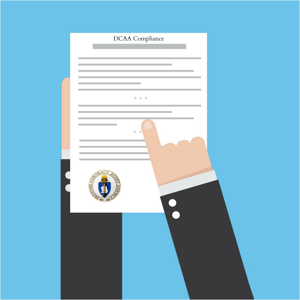 Government contractors typically want to achieve and keep in compliance with the Federal Acquisition Regulations and the Defense Contract Audit Agency's policies and procedures. While an audit is never much fun, it's even more daunting for contractors facing DCAA scrutiny, especially for the first time. In the years that I have been working with federal contractors, I can tell you that most contractors I've met pride themselves on being transparent and want to do the right thing with the taxpayer money that they have been awarded in exchange for the goods and services that they provide.
Government contractors typically want to achieve and keep in compliance with the Federal Acquisition Regulations and the Defense Contract Audit Agency's policies and procedures. While an audit is never much fun, it's even more daunting for contractors facing DCAA scrutiny, especially for the first time. In the years that I have been working with federal contractors, I can tell you that most contractors I've met pride themselves on being transparent and want to do the right thing with the taxpayer money that they have been awarded in exchange for the goods and services that they provide.
Contractors can plan ahead to ensure that their audit encounter goes smoothly. That means having the support and technology necessary to remain confident and compliant.
Here are a few tips to ensure that the audit goes smoothly.
Understand the terminology
Knowing what’s being asked of you in the audit is critical and that means understanding the terminology that can be confusing and bewildering, especially for new contractors. The DCAA follows guidelines set up in the Federal Acquisition Regulation (FAR) and Cost Accounting Standards (CAS) rules. You need to understand these rules and how they affect your business accounting.
Get professional support
It’s usually smart to engage with a CPA firm or independent consultant that specializes in government contracting. You need expertise that can help in the preparation, submission and discussion of your case with the auditors. Answering a question the wrong way can have severe consequences. Because the auditors are charged with protecting taxpayers’ money, the depth of detailed information that is required for compliance is significant.
Keep audit within scope
DCAA auditors are primarily concerned with incurred costs. They are often focused on how costs are allocated, classified, segregated and reported. Key areas often under scrutiny are allowable vs. unallowable costs, direct and indirect costs, and cost pooling.
The DCAA audit will hone in on one or more areas of your business. It’s important to understand the type of audit you are getting. There are many different possibilities – from pre-award, incurred costs and forward pricing audits to compensation and floor check audits. The two most common are:
- Pre-Award Audits. These audits look at your accounting systems, policies and procedures. Your cost accounting system needs to be compliant with federal guidelines. This means ensuring that specific accounting practices are being followed addressing everything from timesheets to billing vouchers to ensure compliance.
- Incurred Cost Audits. These audits assess the validity of submitted or anticipated vendor costs. Auditors want to be sure that costs are reasonable, allocated properly and allowable.
Understand new actions
The DCAA has been under increased Congressional pressure to reduce its audit backlog, especially for incurred cost audits. While the agency has made some strides in recent years, the pressure is on.
In response to this scrutiny, the agency reorganized into three geographic regions. Other key priorities are an increased focus on high-risk post-award audits and business system audits and timely completion of incurred cost and termination audits.
Use the right software
The software you use for your business is a key factor. Shrink-wrapped small business software will not have the sophistication, reporting and industry features that will keep you compliant.
When you license accounting software, you’re buying outcomes. SYMPAQ offers products that meet the accounting standards DCAA is using and applies them to your accounting work. With the right software, your audit outcomes will be optimized.
For example, SYMPAQ’s accounting products use an incurred cost model that lowers the time needed to prepare schedules, reduces manual input, and integrates the cost accounting across all modules. Our reporting functionality creates an audit trail that automatically generates the required schedules to respond to incurred cost questions.
When you use proven software like SYMPAQ that addresses key DCAA requirements, you’ll be better prepared for that first audit and come through it with flying colors.



